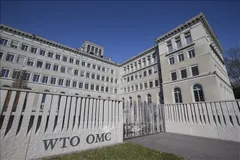Dr. LÊ ĐẠT CHÍ, Faculty of Finance, University of Economics in Ho Chi Minh City, believes that there is a possible solution to this crisis which policymakers can refer to.
JOURNALIST: - Sir, there is an opinion that we should not rescue the real estate market in order to help real estate enterprises, because businesses must accept both profit and loss. However, there is another opinion that says it is necessary to find a way to remove this impasse because it is related to commercial banks. What is your opinion on this matter?
Dr. LÊ ĐẠT CHÍ: - In reality, total rescue is not possible, but we also cannot let real estate businesses operate in a self-destructive manner, because it will affect the banking and financial world. Firstly, we have to look back at the historical process of growth of the real estate market when there was a period when real estate enterprises developed too quickly, leading to many untoward consequences. Even if the legalities of a projects were not complete, real estate enterprises still found ways to disburse capital for investment and called for more capital contribution from investors.
Secondly, finance for real estate enterprises comprised of loans from commercial banks, and the real estate enterprises used these haphazardly. Thirdly, the introduction of the corporate bonds market with the issuance policy was too open, resulting in a rapid increase in bonds with outstanding loans of real estate enterprises. But the most important factor is when the commercial banking system gave loans to real estate businesses when real estate companies faced difficulties. This affected the commercial banking system as well as the quality of bonds investments of real estate companies that commercial banks currently hold.
- Sir, is it possible to open the bank capital so that real estate businesses can rescue themselves?
- In my opinion, it is how to open bank capital that will not affect the operations of the banking and financial system. During 2011 to 2013, the commercial banking system developed credit too quickly, which was directly caused by the real estate market. But the Government also had a solution right after that by establishing the Vietnam Asset Management Company (VAMC) to remove bad debts related to real estate from the balance sheet of banks so as to help commercial banks get capital and open capital flow into the economy through credit. Therefore, in supporting real estate businesses, it is necessary to remove content related to the issuance of bonds of real estate businesses that commercial banks are holding.
- Sir, is a VAMC model related to real estate bonds acceptable?
- Yes, VAMC is a tool that policymakers can refer to. With VAMC, commercial banks that have loans that become bad debts are issued with a corresponding amount of bonds that in return will be held by VAMC. Thereby, a bank can discount this special bond with the State Bank of Vietnam. So, it is to be seen if the State Bank of Vietnam considers this bond as a valuable tool and document to perform special operations.
In my opinion, the State Bank of Vietnam has the authority to support commercial banks in discounting valuable documents. But in return, banks have to be responsible and plan to buy back that bond when the commercial activities become normal again. Just like the VAMC model we have, every year banks have to deal with it themselves by making provision for 20% of the value of that bond lot.
Thereby, commercial banks will get capital, reduce deposit and lending interest rates, and will have capital to implement business plans, as well as credit growth plans, and then capital is pumped into circulation in the economy more easily and the economy prospers. Of course, the real estate market will be rescued and supported by the recovery of the economy and the driving force of economic growth through the credit activities of the banking system.
- Sir, so we can say that the financial system is also partly to blame for this present situation. In your opinion, what lessons have we learnt from this?
- In the past, there was a period when aggregate demand declined, and we stimulated the economy with demand stimulus such as lowering interest rates. Since then, a huge gap has been created, which is for banks to grow credit, while the investment in bonds is considered a loan, so it is in the credit room. This leads to businesses, especially real estate businesses that have a relationship with the banking system, using this tool too easily. Hence, when facing the problem of inflation affecting from outside, policies force us to adapt to the trends of the world, causing difficulties for the economy.
Therefore, firstly, the State Bank of Vietnam must remain cautious in credit growth. Banks all have a lot of real estate related ecosystems, and they can greatly increase credit growth. Secondly, we should not create too many easy loan tools for real estate businesses. In the same project, a real estate enterprise has three tools to borrow money from the bank, sell future contracts to buyers, and issue corporate bonds to implement the project.
When the money arrives at the same time in terms of macro support through reduced interest rates, real estate businesses immediately take advantage of this gap to grow and lead businesses to many projects at the same time. When there are too many projects, the limit on management capacity also causes difficulties and risks for the project itself.
- Sir, recently the Government has issued Decree 08 to amend Decrees 153 and 65, by which issuers can extend the payment time with bondholders. What can be expected from this Decree 08?
- I cannot discuss this decree in depth, but only from the perspective of VAMC. That is to say, Decree 08 was created to help the operations of the commercial banking system to be partially removed if we apply the VAMC tool to real estate bonds as I analyzed. Because if banks discount corporate bonds that are held by real estate companies, it is required that collateral assets are enough to guarantee the value of debts of bonds issued by enterprises. Decree 08 allows that if the assets are not enough, enterprises can use other assets to supplement and keep the value of the debt. If commercial banks hold when discounting with the State Bank of Vietnam, they will not have to make provision against collateral assets. Hence, the VAMC model is more feasible.
- Sir, after the real estate market and corporate bonds market overcome the current difficult period, will the existing legal framework be enough for the corporate bonds market to develop and ensure benefits for investors?
- Each market and each country chooses a different development model and builds a different financial market. History shows that capital markets developed mainly through banking activities. Vietnamese banks perform two functions, namely, retail banking and investment banking. While issuing bonds is a medium and long-term capital mobilization tool in the US, only investment banks participate and businesses in the US mobilize capital for production and business. If they borrow working capital, they will go to retail banks. Then, the credit rating will force investment banks to make provisions.
This story is set in the role of a Vietnamese bank that is both a retail bank and a bonds investment and loan bank. So, what if we evaluate the bonds rating or a bonds investment of a commercial bank that encounters the problem of not paying the correct interest and principal and we need to also see if that bank can make provision or transfer that debt to the next debt group.
For instance, if an issuer fails to repay a debt to a bondholder, we must see if the bank that is lending to that enterprise will fall into risk rating, bad debt, or change the debt group. In Vietnam, it is almost nonexistent. Therefore, it is possible that the issuing enterprise may not repay the bondholders on time, but by paying the debt on time to the bank so that enterprise is still a good enterprise for the banking system. There must be a connection between two assessments which create confidence for businesses as well as responsibility for enterprises when issuing debts.
- Thank you very much.




















